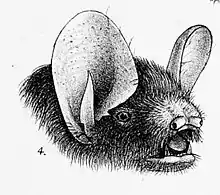Greater tube-nosed bat
The greater tube-nosed bat (Murina leucogaster) is a species of bat. An adult greater tube-nosed bat has a body length of 4.2-5.7 cm, a tail length of 3.6-4.1 cm, and a wing length of 3.7-4.4 cm. The species is found in India, Mongolia, China, and Korea.
| Greater tube-nosed bat | |
|---|---|
 | |
| Scientific classification | |
| Domain: | Eukaryota |
| Kingdom: | Animalia |
| Phylum: | Chordata |
| Class: | Mammalia |
| Order: | Chiroptera |
| Family: | Vespertilionidae |
| Genus: | Murina |
| Species: | M. leucogaster |
| Binomial name | |
| Murina leucogaster (Milne-Edwards, 1872) | |
The greater tube-nosed bat's call has twelve simple syllables and five composites with harmonics in the ultrasonic range. When emitting aggression calls, they bare their teeth, pull up their wings, and attack other individuals by biting. Males have stereotypical mating behaviors of shaking their bodies and licking their genitalia.[2]
References
- Stubbe, M.; Ariunbold, J.; Buuveibaatar, V.; Dorjderem, S.; Monkhzul, T.; Otgonbaatar, M.; Tsogbadrakh, M.; Francis, C.M.; Bates, P.J.J.; Csorba, G. (2016). "Murina leucogaster". IUCN Red List of Threatened Species. 2016: e.T13943A22093328. doi:10.2305/IUCN.UK.2016-2.RLTS.T13943A22093328.en. Retrieved 20 November 2021.
- Lin, Hong-Jun; Kanwal, Jagmeet S.; Jiang, Ting-Lei; Liu, Ying; Feng, Jiang (2015). "Social and vocal behavior in adult greater tube-nosed bats (Murina leucogaster)". Zoology. 118 (3): 192–202. doi:10.1016/j.zool.2014.12.005. PMID 25862078.
- Won, Byeong-o (원병오) (2004). 한국의 포유동물 (Hangugui poyudongmul, Mammals of Korea). Seoul: Dongbang Media. ISBN 89-8457-310-8.
This article is issued from Wikipedia. The text is licensed under Creative Commons - Attribution - Sharealike. Additional terms may apply for the media files.
